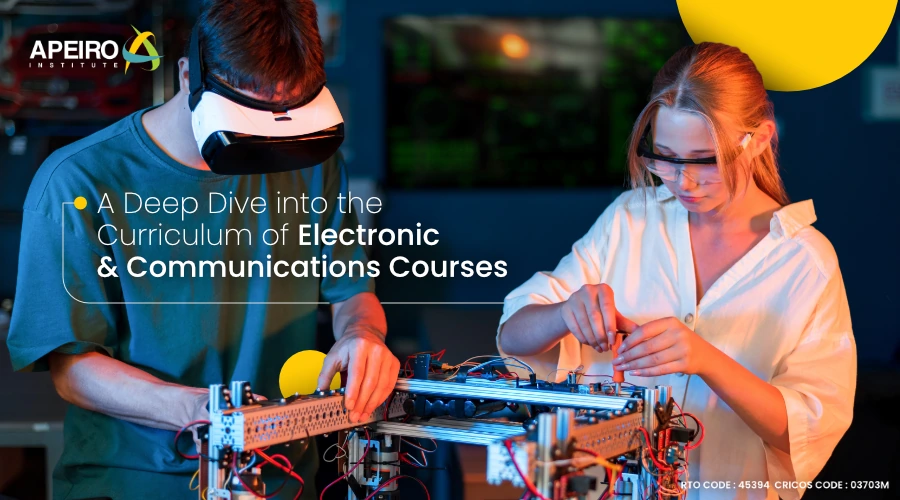Electronics and Communications is an ever-evolving field that has seen remarkable advancements in recent years. With the advent of technologies like 5G, Internet of Things (IoT), and Artificial Intelligence (AI), there has been a surge in demand for skilled professionals in this field. Pursuing a degree in Electronics and Communications from a reputable institution can open doors to a plethora of opportunities and a promising career.
Australia is a popular destination for international students looking to pursue higher education in Electronics and Communications. In this blog, we’ll explore the reasons why studying Electronics and Communications in Australia can be a smart career move.
- High-Quality Education
Australia is home to some of the world’s top-ranked universities, offering a world-class education in Electronics and Communications. Universities such as the University of Melbourne, the University of New South Wales, and the Australian National University are renowned for their excellence in research and teaching. These universities have state-of-the-art facilities and experienced faculty members who are experts in their fields. Studying in these institutions can provide students with the skills and knowledge required to succeed in the field of Electronics and Communications.
- Wide Range of Courses
Australian universities offer a wide range of courses in Electronics and Communications. Students can choose from a variety of undergraduate and postgraduate degrees, diplomas, and certificates. These courses cover a broad range of specializations such as telecommunications, electrical engineering, wireless communications, digital signal processing, and many more. The curriculum of these courses is designed to be industry-relevant, providing students with hands-on experience and exposure to the latest technologies.
- Industry-Relevant Curriculum
The curriculum of Electronics and Communications courses in Australia is designed to be industry-relevant, preparing students with the necessary skills and knowledge to succeed in the field. The courses are regularly updated to reflect the latest trends and advancements in the industry. In addition, many universities have strong industry connections and collaborations, providing students with the opportunity to work on real-world projects and gain practical experience.
- Opportunities for Research
Australian universities are renowned for their research-intensive environment, providing students with the opportunity to participate in cutting-edge research projects and work alongside leading researchers in the field. Pursuing research in Electronics and Communications can provide students with a deeper understanding of the field, and open up opportunities for further studies and career advancement.
- Multicultural Environment
Australia is a multicultural society, and its universities reflect this diversity, welcoming students from all over the world. Studying in Australia can expose students to different cultures and ways of thinking, broadening their horizons and enhancing their personal and professional development. Many universities also have student exchange programs and international internship opportunities, providing students with the chance to gain valuable global experience.
- Employment Prospects
Graduates in Electronics and Communications from Australian universities are highly sought after by employers, both in Australia and internationally. Australia’s strong economy and growing tech industry offer excellent employment opportunities for graduates in this field. Graduates can pursue careers in a variety of fields such as telecommunications, electronics design, software engineering, research and development, and many more.
- Practical Training Opportunities
Australian universities offer practical training opportunities, such as internships and co-op programs, which allow students to gain hands-on experience while studying. These programs provide students with the opportunity to apply their theoretical knowledge in real-world settings, enhancing their skills and employability.
- Government Support for International Students
The Australian government provides support to international students through various initiatives such as the International Student Support Package. The package provides financial and mental health support to international students impacted by the COVID-19 pandemic. Additionally, international students are eligible for post-study work visas, which allow them to work in Australia after graduation.
- Quality of Life
Australia is known for its high quality of life, with a diverse and welcoming community, excellent healthcare, and a vibrant culture. The country has a strong commitment to sustainability, making it a great place to live for those who care about the environment.
- Networking Opportunities
Australian universities provide ample networking opportunities through career fairs, industry events, and alumni networks. These events allow students to connect with professionals in the field, learn about industry trends, and explore job opportunities.
In conclusion, studying Electronics and Communications in Australia can provide students with an exceptional education and an exciting multicultural experience, leading to excellent employment opportunities in the field. With its high-quality education, industry-relevant curriculum, and strong research environment, Australia is a smart choice for anyone looking to pursue a career in Electronics and Communications.
With the most recent, industry-specific courses available at Apeiro Institute, you may further your career in electronics and communications. You will acquire broad abilities and specialized knowledge in the field of electrical engineering with a degree in this discipline. To guarantee that students are studying in an environment that meets industry standards, our facility was specially created. Those who are already employed in the relevant sector as well as those who plan to enter it can apply for these courses in order to advance their education.






